The focus on budgets is "going to cripple the health system".
1. Cardiac specialist quits, saying Dr Lester Levy, the Part Time Health Commissioner, is "living in La La Land" and has no idea what's happening on the ground
Dr Boddington, an electrical cardiologist, was the only person who did certain procedures for heart arrhythmia patients in the Bay of Plenty, and he also had general cardiology duties.
Boddington .. said the final straw for him was specialists being told they would have to fill in for junior doctors in the emergency department, on top of their other work…
A colleague from the cardiology department has also recently retired, and despite also giving significant warning, neither has been replaced.
He said the person found to replace him couldn't start until September 2025…
High priority patients were waiting up to 6 months to be seen and low priority patients "I'm not sure you're gonna get seen at all," Boddington said.
Health Commissioner Lester Levy was "living in La La Land" and Te Whatu Ora had no idea what was happening on the ground, he said.
The focus on budgets was "going to cripple the system".
And he expected more doctors would quit…
Boddington planned to remain in private practice, and was considering working overseas.
Source: Health system relies on doctors overworking, says burnt out cardiologist
2. Dunedin’s Council Committed Fight For Healthcare
Dunedin Council is committing more funds to the Save Our Southern Hospital campaign.
Last year, the council approved the equivalent of $1 per person in Dunedin - to a tune of $130,400 - to support their hospital campaign…
They are now committing another $1.10 per person despite a tight budget…
Councillor Marie Laufiso:
"People do not seem to perceive that it is life and death. It is already a health system that does not serve our people well and we have to fight."
The public march against the proposed cuts to Dunedin Hospital attracted more than 30,000 people, and cost about $37,025 to run.
Source: Dunedin council commits to funding of Save Our Southern Hospital campaign (RNZ)
3. Health NZ's proposal to cut chief clinical roles is "a declaration of war" on rural and regional hospitals.
As previously reported by RNZ, a proposed restructuring involves reducing the number of "districts" from 18 to 14, with Lakes merged with Bay of Plenty, MidCentral with Whanganui, Wellington and Hutt Valley with Wairarapa, and South Canterbury with Southern.
Apart from Canterbury and Southern, all existing clinical leadership positions in medical, nursing and allied health would be disestablished - 23 roles…
One doctor told RNZ there was "a clear message" from staff from all disciplines about the detrimental impacts on patients they foresaw from losing local clinical leadership.
"This proposal would be devastating for Rotorua and Taupo Hospitals and the wider Lakes community…”
Sarah Dalton, who represents senior hospital doctors and dentists, said the plan represented a "dumbing down" of the clinical voice, particularly in regional New Zealand…
Giving staff less than a month to provide feedback suggested Te Whatu Ora was not interested in "genuine consultation"..
"I have yet to find a single senior doctor in favour of this proposal, and I would have to say a number of senior managers share our concerns about what is proposed here."
23 clinical leadership roles are proposed to be cut - despite doctors and nurses saying this is reducing frontline staff and a disaster for local communities.
Nurses Organisation chief executive Paul Goulter said the plan contradicted the government's directive for "a stronger local focus".
"We also think that it's outside of what we understood to be the promises that there would not be a reduction in clinical roles. This is a reduction in clinical roles."..
Health New Zealand declined an interview.
Source: Cuts to clinical leadership bad for regions, say frontline health workers (RNZ)
4. Rural communities need more targeted mental health support
Mental health and wellbeing advocates want the government to address health inequities people living in rural communities face..
Hauora Taiwhenua Rural Health Network chairperson and rural GP, Dr Fiona Bolden, said the government’s plan was too narrow and did not address the diverse needs of people living in remote areas.
The consultation document said suicide rates were about 40 percent higher for males and 20 percent for females living in rural areas, when compared to those living in urban areas…
This current rate of 11.2 people per 100,000 people was higher for Māori at 16.3 per 100,000 and even higher for the age group of 25-44 age group, when compared to Pākeha.
5. Benefit forecasts highlight need for tougher sanctions, government says
The total number of people on welfare had increased..
The total number of young people on welfare had also increased, but MSD again put this down to economic conditions.
Young clients were more likely to have lower skill levels, more casual employment arrangements, and high levels of employment in sectors like the service industry.
The government introduced tougher welfare sanctions and requirements earlier this year…
Speaking to Morning Report, Upston blamed the previous government for the statistics, saying its approach was not working…
Carmel Sepuloni, who is also deputy party leader, told First Up the government is making it out like young people are abusing the system and need to be dealt with.
Sepuloni said when economic conditions are bad, young people are the first to miss out on employment.
She also said Upston needed to read the report properly and look at the risk factors, something the government "continues to ignore".
Such risk factors include economic conditions, time spent in prison, mental heath issues, hospitalisation and previous Oranga Tamariki care.
To create meaningful change, the government needed to really look at the report and address those risk factors, she said.
Sepuloni said the report also did not take into consideration people with long-term disabilities who found getting work - or sustaining it - difficult, or seasonal workers.
6. Government approves first private building consent company
A private company has received accreditation to issue building consents – a first for New Zealand, where over-stretched councils handle consents.
The revelation comes as the Government announces significant changes to the building consent system that will also allow tradies to self-certify their own work…
It’s a big change. For many years, anyone wanting to construct any building – whether it be a home, an office block or a stadium – has had to seek approval from a council. The only exception was state housing agency Kāinga Ora, which had its own consenting authority.
According to a report this year from the Office of the Auditor General, only three of the country’s 67 councils met the statutory timeframe to process their building consents within 20 working days.
Source: Private building consent business accredited in first for NZ (Newsroom)
7. Commercial insurance could torpedo self-certifying build plans
No commercial insurer in the New Zealand market offers builders cover for non-completion or defective work, and that will be a problem for the Government’s planned consent reforms.
Building and Construction minister Chris Penk has announced that an opt-in self-certification scheme for qualified building professionals working on low risk residential builds will be developed.
The goal is to “cut through the tangle of red tape”..he said…
At the policy launch in Auckland, Penk said consumers would be best served by relying on these mechanisms in conjunction with assurance such as guarantees and bonds ‒ for example those offered by Master Builders and Certified Builders…
That could be a problem. Canterbury-based construction expert Mike Blackburn said there was a need for adequate insurance cover to go along with the proposed changes.
“But there is a real gap between what the Government is talking about, and the ability of the industry to obtain the required cover.”
Builtin Insurance Brokers director Ben Rickard said the Government was essentially looking to the guarantee programmes offered by Master Builders and Certified Builders for consumer protection.
The mention of insurance was misleading because there were no commercial insurance policies covering non-completion and defective work available for builders in the New Zealand market, he said.
Source: Insurance could torpedo self-certifying build plans (The Post)
8. Queenstown may get government’s “golden ticket” to help pay for infrastructure
Recent population projections predict Queenstown will be bigger than Dunedin sometime in the 2040s. As it is, the resort town has almost reached city status…
Pouring fuel on the flames is the Government’s recently released fast-track list, which will speed up projects bringing potentially thousands of new houses to the area, all needing new roads, water connections, and sewerage system links.
Lewers says: “Our question is, well, who’s going to provide the infrastructure?”
..The great hope for Queenstown now is the Government’s regional deals. In August, at Local Government New Zealand’s conference in Wellington, the sector’s minister, Simeon Brown, revealed more details…
Newsroom asked Infrastructure Minister Chris Bishop if the Government was fast-tracking thousands more houses in Queenstown, isn’t it fair to pull some levers to allow the council to find new ways to pay for the required infrastructure?
“The Government agrees that housing and infrastructure policies need to be complementary,” he says. The Government’s working on giving councils “stronger tools to fund and finance local infrastructure required to support housing growth”, he says…
Source: Mayor hopes Queenstown will get Govt’s golden ticket (Newsroom-in-depth)
9. Nicola Willis confirms no work-from-home directive was not based on data
Public Service Minister confirms the call to rein in remote work arrangements was based on conversations, not calculations
Public Service Minister Nicola Willis cannot name any businesses that support the Government’s work-from-home directive, despite saying data is critical to understanding the subject.
Source: No list of businesses to back Willis’ work-from-home stance ($$$) (Newsroom)
10. The Treaty Principles Bill depends on a lack of public knowledge about the history of te Tiriti and the egregious breaches that followed its signing
There has been much written about the shock announcement of former Act leader Richard Prebble being appointed to a position on the Waitangi Tribunal.
Unsurprisingly, this has been welcomed by the present Act leader and author of the Treaty Principles Bill, David Seymour..
Given his is not an accurate view of what the Treaty actually says, it cannot be helped that people think Prebble’s new role is nothing but a partisan appointment on what is meant to be an independent tribunal.
However, my purpose is not to discuss Prebble. It is to lament the loss of one of the Tribunal members, who has served only one term, and whom he essentially replaces…
Dr Hana O’Regan..
Source: Seymour is relying on us not knowing our history (Newsroom)
10. Attendance rates worsen to crisis levels
David Seymour is responsible for school attendance, and as it worsens to “crisis point” he says he is keen to give it more money.
In a report published on Wednesday the Education Review office said 80,000 children were chronically absent in term two this year, generally the worst of the four school terms in terms of attendance.
It said that meant one in 10 students missed more than 30 percent of class time that term, double the figure 10 years ago.
"We are really worried. We think chronic absence has reached crisis levels," head of the ERO's education evaluation centre Ruth Shinoda told Morning Report.
Elsewhere, Seymour said he didn’t want to ban Nazi symbols - echoing Paul Goldsmith last month - but he said gang symbols needed to be banned as they made people feel uncomfortable.
Source: David Seymour keen to give attendance services more money (RNZ) & David Seymour not keen on swastika ban - despite gang patch crackdown
AROUND THE WORLD IN PICTURES
SPAIN - “It was like a tsunami”



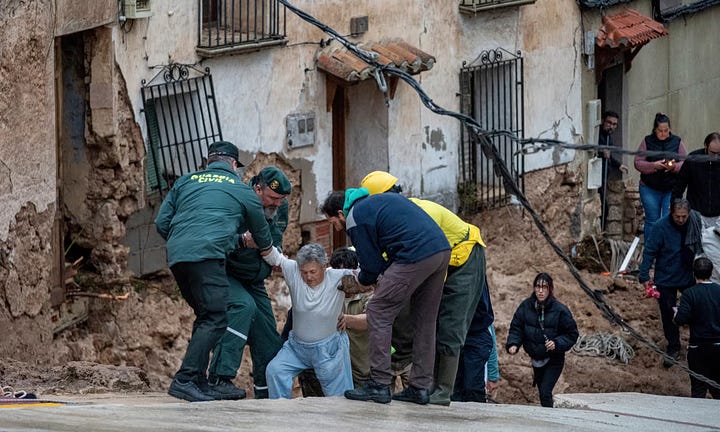
Thousands of people experienced Tuesday night’s flash floods which engulfed the region and killed more than 70 people.
Emergency services scrambled to bring assistance across the region, but the speed at which the water filled the streets was unprecedented.
USA
In the USA, the national average salary was $59,384, according to the U.S. Bureau of Labor Statistics.1





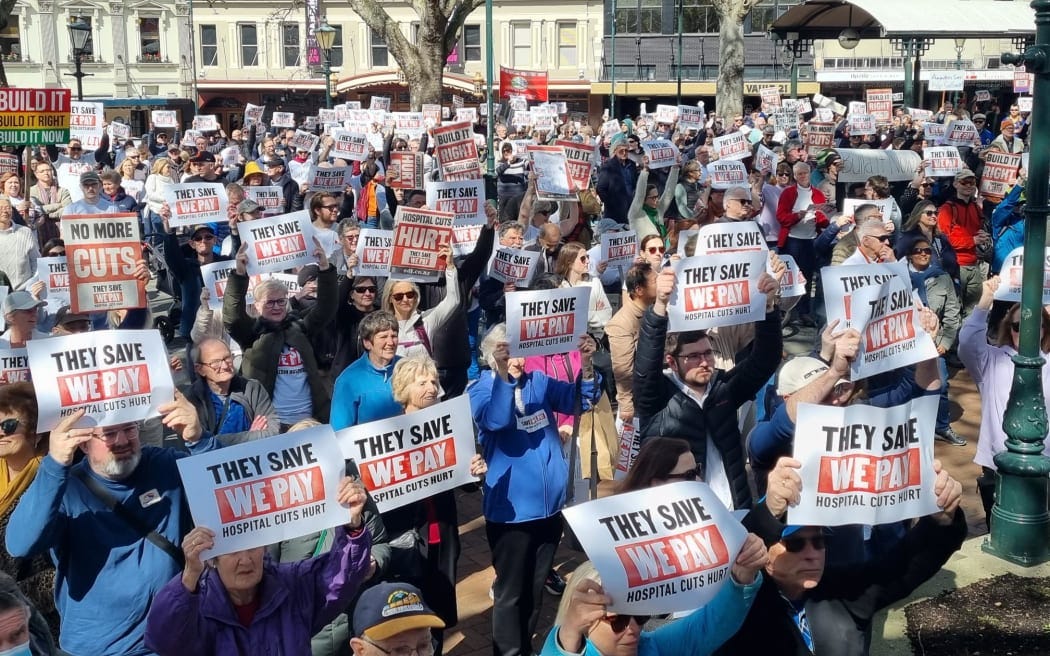
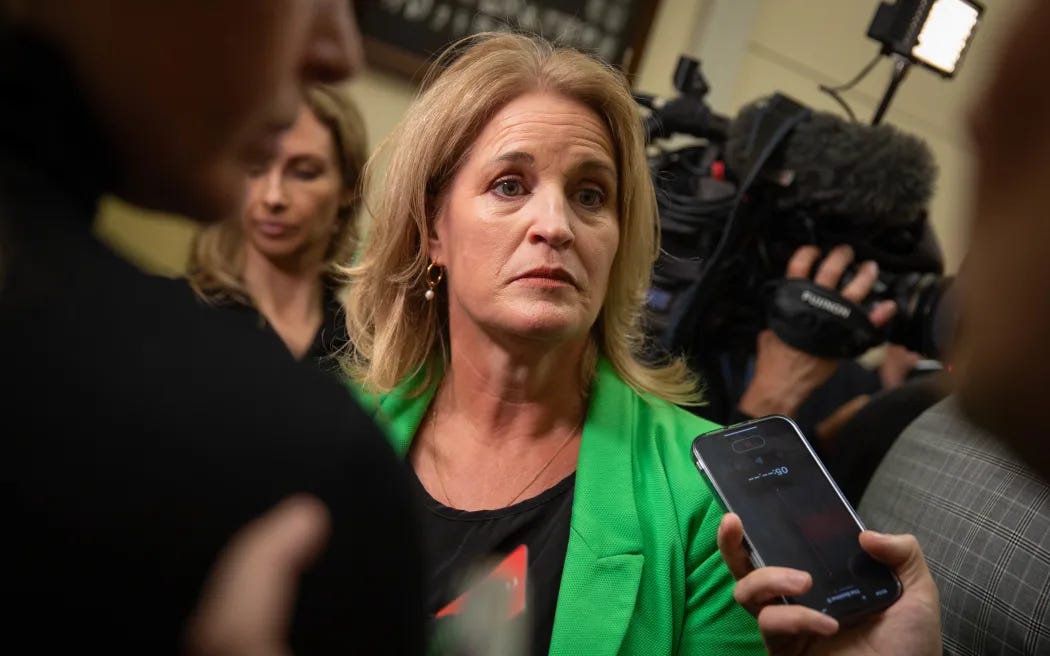
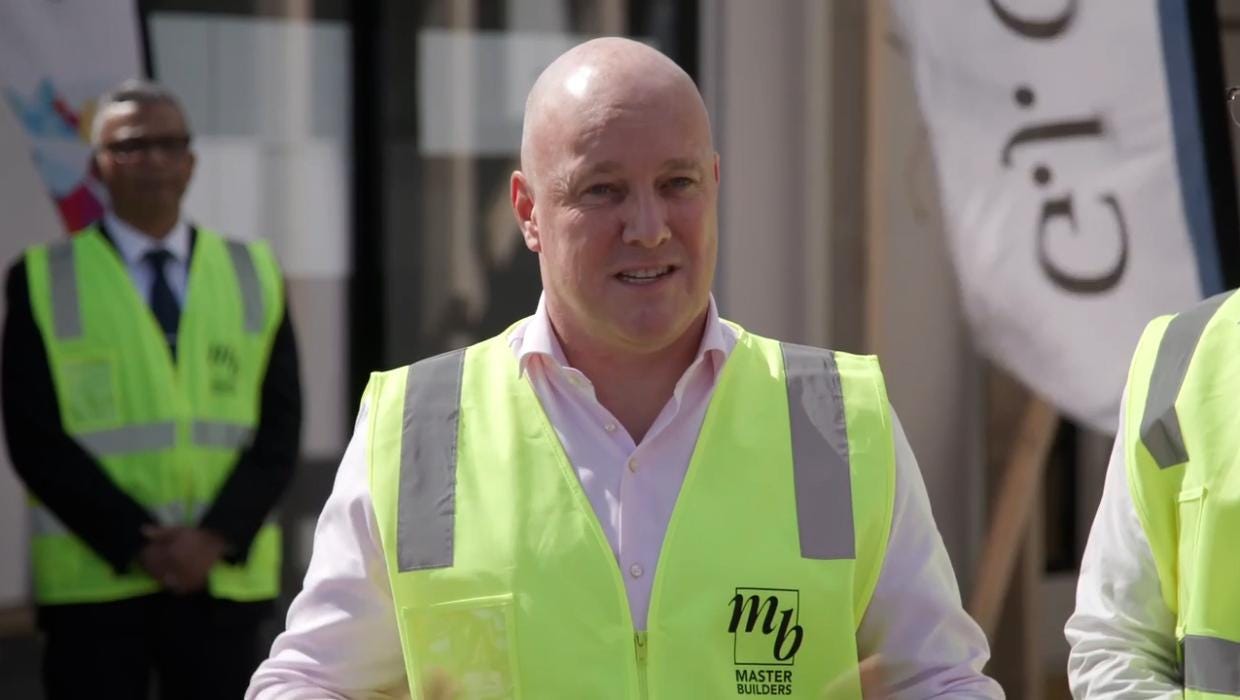
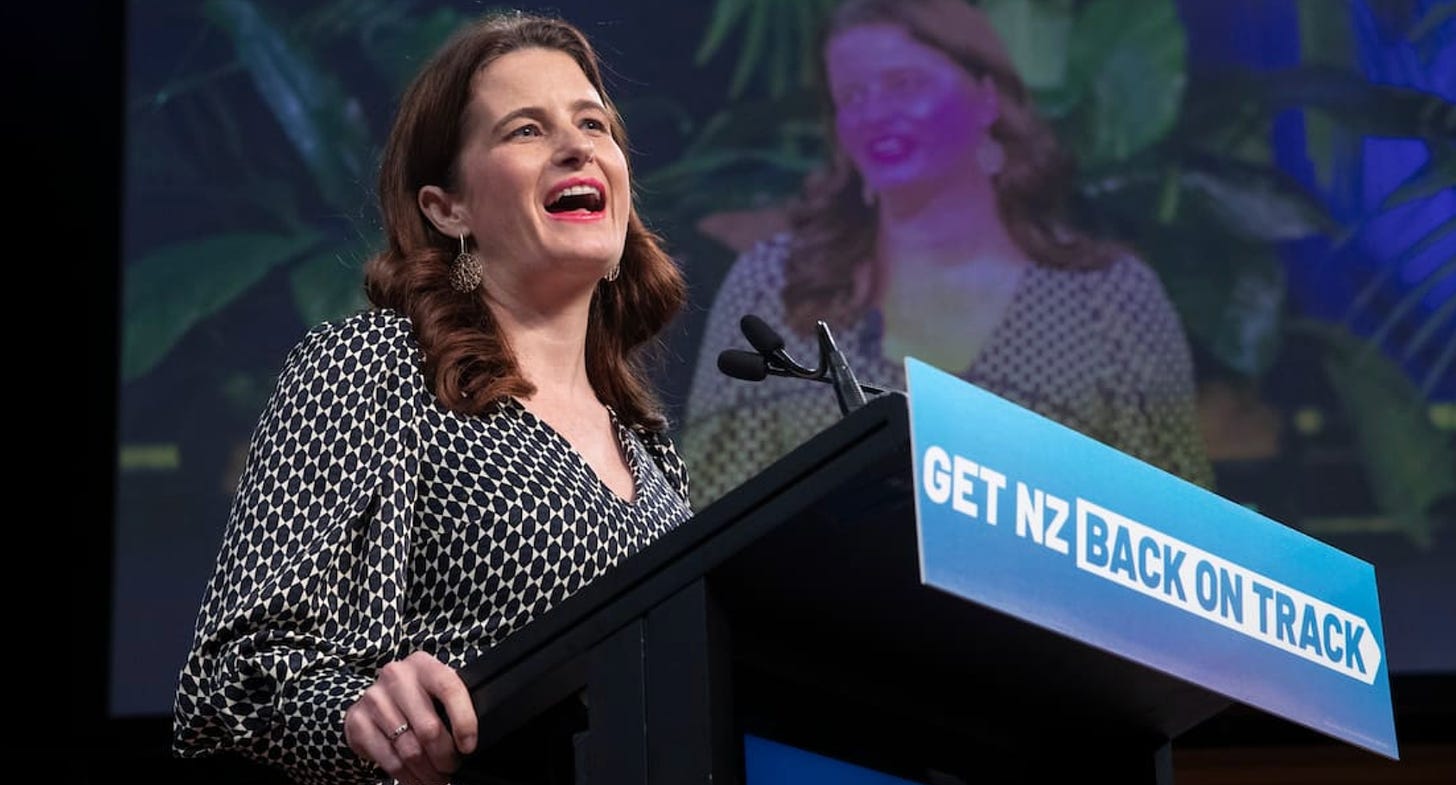

Excellent roundup, thank you MT.
Thanks MT. It is appalling that a council has to fund a campaign to get the Dunedin hospital built. A campaign promise from National now cancelled. Feels like this is just the beginning.